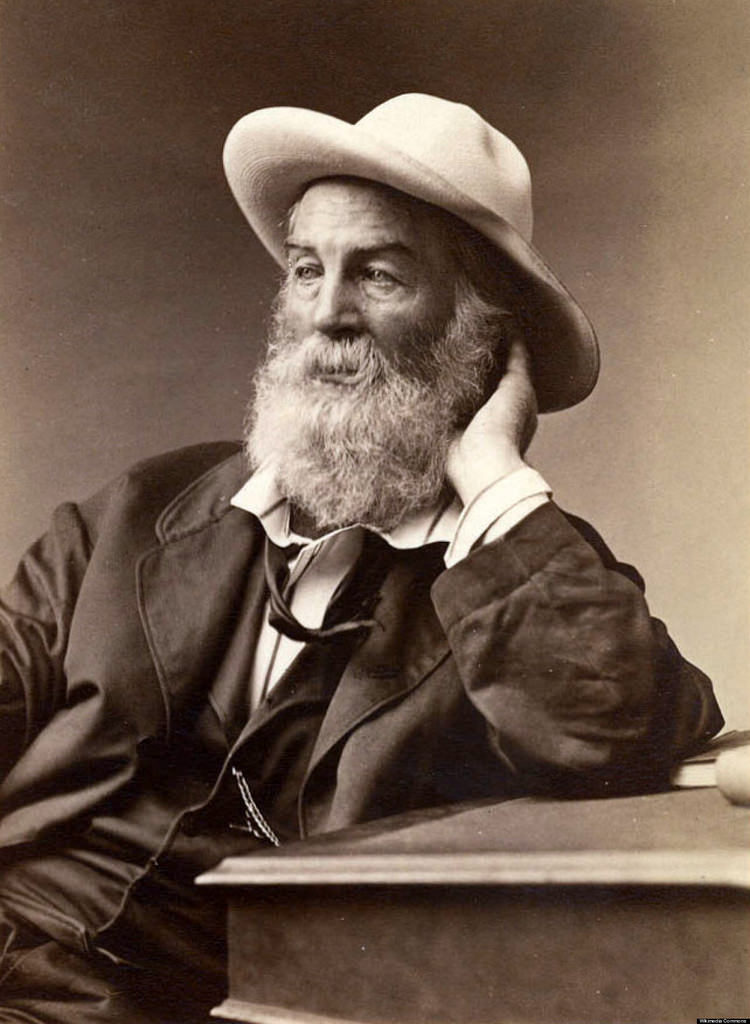
It’s said that Walt Whitman has been set to music more than any other poet save Shakespeare.
Oddly, the most memorable of these settings may be by an Englishman: Frederic Delius’s Sea Drift (1904) and Songs of Farewell (1930). There are also notably affecting Whitman settings by Ralph Vaughan Williams and Kurt Weill.
What about settings by American-born composers? An unlikely candidate may be the best of the bunch. It’s a 1944 radio play, just revived by PostClassical Ensemble at the Washington National Cathedral thanks to the invaluable advocacy of the Herrmann scholar Christopher Husted, who recreated the score and parts. You can hear it here: https://www.wwfm.org/post/postclassical-presents-music-bernard-herrmann
The makers of this 30-minute Walt Whitman were the titans of the genre: Norman Corwin and Bernard Herrmann. Beginning in 1939, they collaborated on original radio dramas 21 times. Corwin scripted and directed; Herrmann composed the music. Corwin’s distinctive free-verse style derived from Whitman (and also, he testified, Carl Sandburg and Thomas Wolfe — lesser writers). Herrmann’s radio work at CBS was the fundament for his unforgettable film scores, the first of which – Citizen Kane (1941) – was composed for Orson Welles, himself a radio-drama legend.
Amazingly, Corwin, Herrmann, and Welles were all in their twenties when they first made their mark on live radio. By the time Corwin and Herrmann converged on Whitman, American radio drama peaked as an eloquent mass-strategy to rally the home front. And so Walt Whitman was invoked as a champion of American democracy in time of war.
Herrmann was a composer whose versatility is still not acknowledged. His film scores, his radio scores, his cantata Moby Dick, his big 1941 symphony, his opera Wuthering Heights all speak the same moody Romantic language. And Herrmann at 33, composing Whitman, already sounds like the composer of Vertigo (1958). The most hypnotically Romantic passage, magically scored for strings, harp, and celesta, supports Whitman’s sublime imagery of grass:
I guess the grass is the beautiful uncut hair of graves.
Tenderly will I use you, curling grass.
It may be you transpire from the breasts of young men.
You can hear it by scrolling to 31:35 of Part Two here: https://www.wwfm.org/post/postclassical-presents-music-bernard-herrmann
Re-encountering this 30-minute radio poem today (our performance was the professional concert premiere), I marvel at the listening habits of Americans 75 years ago. But then, Americans once listened raptly to the high-pitched (and frequently obscure) rhetoric of Ralph Waldo Emerson. As listeners, as readers and speakers, our stamina has sharply diminished in the age of social media.
The film-historian Neil Lerner, one of the commentators at the National Cathedral performance, pointed out that Corwin’s script actually acknowledges the challenge of sharing aspirational poetry with a mass audience. He interpolates a “Voice” whose interruptions include:
“I don’t follow you. You’re over my head. Anyway, why don’t you calm down? There’s nothin’ to get excited about. Take it easy.”
Corwin here segues seamlessly to Whitman:
Did you ask dulcet rhymes from me?
Did you seek the civilian’s peaceful and languishing rhymes?
Did you find what I sang so hard to follow?
Why I was not singing for you to follow, to understand – nor am I now;
What to such as you anyhow such a poet as I? therefore leave my works,
And go lull yourself with what you can understand, and with piano-tunes,
For I lull nobody, and you will never understand me.
At the National Cathedral performance, William Sharp’s delivery of Whitman’s words gripped and held.
The program – a June 1 Bernard Herrmann tribute coinciding with the Whitman Bicentennial – also included music from Psycho and Herrmann’s 1967 clarinet quintet Souvenirs de voyage. The Psycho music – a terrific performance led by Angel Gil-Ordonez — wasn’t the usual suite of film excerpts, but a persuasive “narrative” for string orchestra created by the composer himself. The quintet – which I have several times extolled in this space – seems to me the most beautiful chamber music by any American. Our principal clarinetist, David Jones, is an inspired advocate.
The Cathedral concert continued PostClassical Ensemble’s advocacy of Bernard Herrmann as “the most under-rated twentieth century American composer” – a claim we pursued for weeks during a 2016 Herrmann festival.
A forthcoming PCE Herrmann recording, on Naxos, will feature the world premiere recording of Whitman, along with the Psycho narrative and clarinet quintet. Herrmann deserves to be as well-known to American concert audiences as Copland or Gershwin.
The WWFM Network live broadcast of our June 1 concert is now on the web: https://www.wwfm.org/post/postclassical-presents-music-bernard-herrmann
It begins with the Psycho narrative, followed by:
–Dorothy Herrmann describing her crusty father (Part One: 29:59)
–The clarinet quintet (Part One: 31:15)
–An intermission feature including the Whitman scholar Steven Herrmann and Murray Horwitz of WAMU’s The Big Broadcast (Part Two: 00:00)
—Whitman (Part Two: 17:35)

Leave a Reply